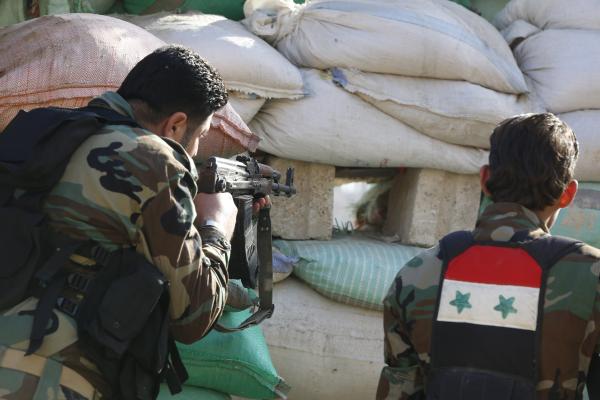The Russian Prime Minister Dmitry Medvedev was quoted as saying that ground intervention in Syria could result in a third world war at the Munich conference. Despite the seriousness of this statement, no one paid any attention to him because what he said seemed unrealistic and a figment of the imagination of the Iranian media, which has been repeated constantly by Moscow.
The world war hypothesis is unrealistic and is just media exaggerations that strategists do not take seriously. If such a confrontation was to take place, it would have taken place because of Russia’s occupation of the Crimea but the west was satisfied with issuing statements of denouncement. A world war is not part of the major power’s dictionary and Syria is a battle on the side for the west and somewhere for the Russians to show off their might.
Just as Syrian rebels succeeded in defeating Iranians in Syria during the last two years, they will be able to defeat the Russians soon if the opposition receive the arms it needs to fight the Russian air force. The Iranian Revolutionary Guard has taken command of the war in Syria during the last two years with the help of Russian logistical and military support, financial support from Iraq and fighters from the Lebanese Hezbollah and Iraqi militias. Despite this, they were not able to advance far and the suburbs of Damascus like Ghouta remain under rebel control. The Iranians even failed to lift the sieges on the cities of Nubul and Zahra despite promises and the large publicity that accompanied the battles. The siege was only lifted a few days ago, days after Russia entered the war.
There will not be a world war and there will not be a direct military clash between Russia and the west. Neither will there be confrontation between regional forces like Turkey considering that both sides have tested the limits of tension between them when the Turks brought down the Russian Sukhoi aircraft. What we can expect, however, is that the battles will continue with greater support for the opposition and increased Russian involvement as a result of Russian military interference and the attempt to impose the Iranian solution on the Syrian people.
Here we see the Russians angry at support for the opposition and Saudi Arabian statements about ground intervention against ISIS in Syria because the aim of their massive military campaign is to impose a new status quo like seizing Aleppo and then imposing a political solution in Geneva. If they fail to do this in the near future, the Russians would have ruined Syria entirely without any political gain which is the main goal of war.
The regional and international stance is important in reaching a settlement in Syria, not just that of Russia and Iran. It is likely that the west will not directly intervene in the war there, however countries like Turkey and GCC countries may be forced to intervene in some way or increase their support to the Syrian opposition at which point the west will have no choice but to support it in light of the crisis’ expansion by the millions of refugees, the threat of terrorism and the increase in the frequency of violence.
The Russians are angry at the prospect of any intervention under any title and this includes supporting the opposition that suffered major setbacks as a result of Russian intervention. With the increase in threatening language, the Russians are able to obtain a political half victory if they accepted the concept of a joint rule solution- the opposition with the Syrian regime minus Assad. The Syrian opposition that refused this proposal is no longer in a military position to refuse everything. Turkey and the Gulf countries have already expressed their acceptance of this political solution. However, the opposition’s allies will have to support it on the ground in order to push this solution forward because military action is the most important tool in the negotiations. This was expressed by the Russian Foreign Minister Sergey Lavrov when he told the “Moskovsky” newspaper a few days ago that betting on a military solution has become a reality.
Turkey is the main player on the other side and there is doubt that its reluctance to intervene has placed it in multiple crises. The Russians and the Iranians are now active in building a long hostile Kurdish Front along the Turkish border to separate Syria from Turkey. This means marginalising the role of Turkey and its influence in Syria on one side, and threatening the security of Turkey continuously on the other. I do not think that the Turks will allow this dangerous development and they have no choice but to increase support of the opposition and activate the role of the refugees to form an alternative liberation army. Perhaps things would not have reached this point of complexity if the Russians and Iranians were convinced of the seriousness of the threats against them and find that accepting the proposed political solution is in their interests.
